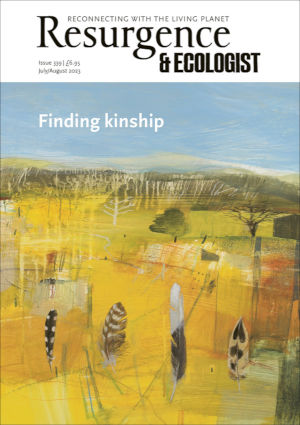In the latest in his series of books on classical Chinese poetry and philosophy, David Hinton draws on his deep understanding of Ch’an/Taoist teachings to show how we in the west are entrapped in a worldview that is increasingly destructive to ourselves and the world around us. His argument is both complex and subtle, showing how we might find liberation in our deep original identity: wild mind in wild Earth.
Before all else, “we love this world around us,” with a love that brings us joy and grief, Hinton reminds us in the opening lines. Yet how can this be, when our western assumptions tell us in so many ways that we humans are fundamentally ‘other’ than Nature? Our “philosophical home”, the Greek-Christian paradigm, forms a barely noticed body of assumptions that permeates every aspect of our lives. Western humans “operate with the unspoken assumption that we are spirit-centres rad-ically separate from the world around us. We do this even if we know better, for it is unnoticed.” This separation creates a deep wound, an “elemental sorrow”, so complete we cannot see it.
Hinton explores what he sees as significant trends within western culture to heal this rift, including the radical vision of poets such as Robinson Jeffers in America, William Wordsworth and the English Romantics; in ‘The Land Ethic’ of Aldo Leopold; and in Lynn White’s classical essay on the historical roots of our ecological crisis. He argues that all these admirable efforts remain caught in the “terminological limits” of the western worldview. ‘‘Wordsworth and his compatriots still needed to conceive their revolution within the as yet unimpeachable Christian framework – and in that framework, the only explanation for those rapturous feelings was some kind of communion with a divine presence in landscape.”
Where then should we turn? Hinton argues that we can learn from ancient Chinese ways of thought as recovered by the Taoist sages and poets after the authoritarian and monotheist Shang period in the 5th and 6th centuries BCE. The cultural renaissance led by Lao Tzu and others drew Chinese intellectuals back to the Palaeolithic cultural assumptions on which Ch’an and Tao are based, before the separation brought about by Neolithic agriculture. The primary purpose of Ch’an meditation is to learn how to move past the illusory separation between consciousness and cosmos: “Empty-mind mirroring reintegrates consciousness and wild earth’s ten thousand things”, not just as a philosophical perspective but “as a matter of everyday immediate experience” of one’s deepest nature as wild mind integral to wild Earth. The strategy was “to secularize the sacred while at the same time investing the secular with sacred dimensions”.
The second part of the book takes the reader more radically into the Taoist perspective on our current predicament. It calls for closer study than can be accomplished in a short review. Hinton develops the Taoist notion that we are all ‘unborn’: we cannot ‘return’ to the Tao, because we are never out of it. Wild mind is always integral to wild Earth. Our spirit-centre identity, which brings about the destruction that is the Sixth Extinction, is also perfectly natural, another way in which the boundless cosmos and its pure mystery are ceaselessly unfolding, “rife with creation and ravaged with destruction”.
To see this clearly is to be liberated from our human-centred assumptions. “And yet. And yet…” writes Hinton, “we love this world around us, this living planet.” Maybe the most radical view of the Sixth Extinction is that it teaches us our elemental kinship with the ten thousand things, returning us to our original nature as wild mind and wild heart. Living within this paradox is the challenge of our times.
Wild Mind, Wild Earth: Our Place in the Sixth Extinction by David Hinton. Shambhala, 2022. ISBN: 9781645471479







